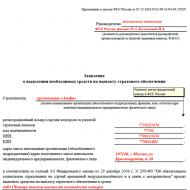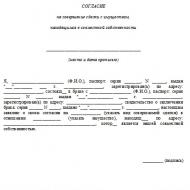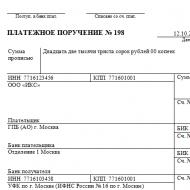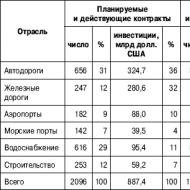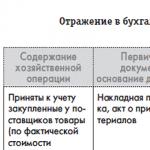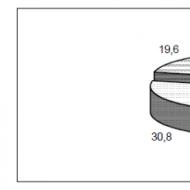
State duty: payers, object of taxation, procedure for calculation and payment. Government duty. A state fee is a fee levied on individuals when they apply to government agencies Self-test questions
Government duty is a fee levied on individuals and organizations when they apply to government agencies, authorities local government, other organs and (or) to officials for the performance of legally significant actions in relation to these persons, with the exception of actions performed by consular offices Russian Federation. At the same time, the issuance of documents (their copies, duplicates) is also equated to legally significant actions.
Payers of state duty are organizations and individuals, which:
1) apply to authorized entities to perform legally significant actions;
2) act as defendants in courts of general jurisdiction, arbitration courts or in cases considered by magistrates, and if the court decision is not made in their favor and the plaintiff is exempt from paying state fees.
Payment procedure and terms. The Tax Code of the Russian Federation provides for the payment of state duty in the following cases:
1) when applying to the Constitutional Court of the Russian Federation, courts of general jurisdiction, arbitration courts or magistrates - before filing a request, petition, application, statement of claim, complaints (including appeal, cassation or supervisory);
2) when applying from individuals - within ten days from the date the court decision entered into legal force;
3) when applying for notarial acts - before performing notarial acts;
4) when applying for the issuance of documents (their copies, duplicates) - before the issuance of documents (their copies, duplicates);
5) when applying for an apostille - before the apostille is affixed;
6) when applying for other legally significant actions - before submitting applications and (or) other documents to perform such actions or before submitting the relevant documents.
By general rule The state duty is paid by the payer himself. If several payers who are not entitled to benefits apply for a legally significant action at the same time, the state duty is paid by the payers in equal shares.
The size of the state duty and the specifics of payment are differentiated by the legislator depending on the type of legally significant actions performed, the category of payers or other circumstances and are established in Art. Art. 333.19-333.34 Tax Code of the Russian Federation.
Privileges. The Tax Code of the Russian Federation provides for a numerous list of benefits for paying state duties in Art. Art. 333.35-333.39.
Refunds or credits for overpaid amounts of state duty are made taking into account the specifics established by Ch. 25.3 part 2 of the Tax Code of the Russian Federation.
Refund of the overpaid amount of state duty is made upon the application of the payer of the state duty submitted to the tax authority at the place of the action for which the state duty was paid. The application is accompanied by a decision, rulings and certificates from courts, bodies and (or) officials carrying out actions for which the state fee has been paid.
An application for the return of an overpaid (collected) amount of state duty may be submitted within three years from the date of payment of the specified amount.
The state duty is a fee collected when applying to state bodies, local governments, other bodies and (or) officials who are authorized in accordance with legislative acts of the Russian Federation, legislative acts of the constituent entities of the Russian Federation and regulatory legal acts local government bodies, for carrying out legally significant actions in relation to these persons.
Payers of state duty in accordance with Art.
333.17 of the Tax Code of the Russian Federation, organizations and individuals are recognized if they:
1) apply for the performance of legally significant actions;
2) act as defendants in courts of general jurisdiction, arbitration courts or in cases considered by magistrates, and if the court decision is not made in their favor and the plaintiff is exempt from paying state fees.
35. Invoices for VAT calculations
An invoice is a document that serves as the basis for the buyer to accept the goods (work, services), property rights presented by the seller (including the commission agent, agent who sells goods (work, services), property rights on their own behalf) for deduction of tax amounts in the manner , provided for by Chapter 21 of the Tax Code of the Russian Federation.
Invoices are not generated: 1) banks, insurance organizations and non-governmental pension funds
2) organizations and entrepreneurs who are engaged retail trade, catering, performing work (providing services) for the population in cash
3) organizations and entrepreneurs who apply special tax regimes in the form of Unified Agricultural Tax, simplified tax system, UTII, since they are not VAT payers
4) organizations and entrepreneurs who sell securities (except for brokers and intermediaries)
38. Excise taxes. Main types of excisable goods
According to ch. 22 of the Tax Code of the Russian Federation the following are recognized as excise tax payers:
1) organizations;
2) individual entrepreneurs;
3) persons recognized as taxpayers in connection with the movement of goods across the customs border of Russia
Excise taxes are a type of consumption tax.
The Tax Code of the Russian Federation provides an exhaustive list of excise taxes goods:
ethyl alcohol from all types of raw materials, with the exception of cognac alcohol;
alcoholic products;
tobacco products;
passenger cars and motorcycles with an engine power exceeding 112.5 kW (150 hp);
motor gasoline;
diesel fuel;
straight-run gasoline;
motor oils for diesel and (or) carburetor (injection) engines
37. Types of state duties, principles of collection
Government duty - sums of money levied by specially authorized institutions (court, notary offices, police, registry offices, authorities financial system etc.) for performing actions in the interests of organizations and individuals and issuing documents of legal significance (consideration of claims, complaints, certification of contracts, wills and powers of attorney, civil registration, state registration legal entity, prospectus valuable papers etc.)
Judicial
Registration
Administrative
The procedure and deadlines for paying the state duty are established by Art. 333.18 Tax Code of the Russian Federation.
The amount of the duty depends on the basis for its payment, the amount of the claim or transaction, and the identity of the payer.
Chapter 25.3 of the Tax Code of the Russian Federation establishes benefits for state duty payers.
State duty is a fee collected from persons when they apply to authorized state bodies, local government bodies, other bodies and (or) officials for the commission of legally significant actions in relation to these persons, with the exception of actions performed by consular offices of the Russian Federation. At the same time, for the purposes of paying the state duty, the issuance of documents (their copies, duplicates) is equated to legally significant actions.
The main regulatory act ensuring legal regulation payment of state duty, from January 1, 2005, is part two of the Tax Code (Section 8 " Federal taxes» Ch. 25.3 “State duty”).
The following are recognized as state duty payers:
– organizations;
– individuals.
The specified persons are recognized as payers if they:
– apply for legally significant actions;
– act as defendants in courts of general jurisdiction, arbitration courts or in cases considered by magistrates, and if the court decision is not made in their favor and the plaintiff is exempt from paying state fees.
Procedure and deadlines for paying state duty. As a general rule, payers pay state duty within the following periods:
- when applying to the Constitutional Court of the Russian Federation, courts of general jurisdiction, arbitration courts or magistrates - before filing a request, petition, application, statement of claim, complaint (including appeal, cassation or supervisory);
- defendants, if the court decision is not made in their favor - within ten days from the date the court decision enters into legal force;
– when applying for notarial acts – before performing notarial acts;
- when applying for the issuance of documents (their copies, duplicates) - before the issuance of documents (their copies, duplicates);
– when applying for an apostille – before the apostille is affixed;
- when applying for other legally significant actions - before submitting applications and (or) other documents to perform such actions or before submitting the relevant documents.
If several payers who are not entitled to the benefits established by this chapter simultaneously apply for a legally significant action, the state duty is paid by the payers in equal shares.
State duty is paid in cash or without in cash.
The size of the state duty and the specifics of its payment are defined in Art. 333.19-333.34 NK.
Benefits for individual categories individuals and organizations are established in Art. 333.35-333.39 NK.
For example, the following are exempt from paying state duty:
– federal government bodies, state off-budget funds Russian Federation, budgetary institutions and organizations;
– courts of general jurisdiction, arbitration courts and justices of the peace, state and municipal museums, archives, libraries and other state and municipal repositories of cultural property;
– individuals – Heroes of the Soviet Union, Heroes of the Russian Federation and full holders of the Order of Glory, participants and disabled people of the Great Patriotic War.
Deferment or installment payment of state duty is provided upon application interested person for up to six months. No interest is accrued on the amount of state duty in respect of which a deferment or installment plan has been granted.
The paid state fee is subject to partial or full refund in the following cases:
– payment of state duty in a larger amount than provided for in the Tax Code;
– return of an application, complaint or other appeal or refusal to accept it by the courts or refusal to perform notarial acts by authorized bodies and (or) officials;
– termination of proceedings in the case or leaving the application without consideration by a court of general jurisdiction or an arbitration court;
– refusal of persons who have paid the state fee to perform a legally significant action before contacting the authorized body (official) performing this legally significant action;
– refusal to issue a passport of a citizen of the Russian Federation.
Refund of the overpaid (collected) amount of state duty is made upon the application of the payer of the state duty submitted to the tax authority at the place of the action for which the state duty was paid (collected).
The application can be submitted within three years from the date of payment of the overpaid (collected) amount of state duty.
Tax authorities carry out verification of the correctness of calculation and payment of state duty in state notary offices, civil registry offices and other bodies, organizations that carry out actions in relation to payers, for the implementation of which a state duty is charged.
State duty is the main form of fees established by the legislation on taxes and fees of the Russian Federation.
The concept of collection is given in Art. 8 Tax Code of the Russian Federation. According to this article under collection understood mandatory contribution levied on organizations and individuals, the payment of which is one of the conditions for the performance of legally significant actions in relation to fee payers by state bodies, local governments, other authorized bodies and officials, including the granting of certain rights or the issuance of permits (licenses).
As can be seen from the definition, a fee is significantly different from a tax. When collecting fees, there is no essential feature of a tax - gratuitousness. A fee is a payment for certain government services to the payer. So, having paid the fee for issuing a passport, a citizen receives his own passport, and when paying the fee for state registration It is the paying company that will be registered as a legal entity. Therefore, the methodology for calculating and paying fees does not include such mandatory elements for taxation as the object of the tax, the tax base, taxable period. For most duties, there are no specific deadlines for payment.
Since payment of the fee is one of the conditions for performing legally significant actions in relation to the payer, which means that the payment is preliminary in nature, tax control is not needed over the payment of fees. If the payer does not pay, he will not receive the corresponding service. Therefore, the fee payer does not submit tax returns on fees paid.
Government duty- this is a fee levied on payers when they apply to authorized state bodies, local government bodies, other bodies or officials for the commission of legally significant actions in relation to these persons, with the exception of actions performed by consular offices of the Russian Federation. The procedure for calculating and collecting state duties is established by Chapter. 25.3 Tax Code of the Russian Federation.
Payers of the state duty (Article 333.16 of the Tax Code of the Russian Federation) are organizations and individuals when applying for legally significant actions, as well as when they act as defendants in courts of general jurisdiction, arbitration courts or in cases considered by magistrates, provided that The court decision was not made in their favor and the plaintiff, accordingly, was exempted from paying state fees.
Payers must pay the state fee in the following cases when applying:
- 1) to the Constitutional Court of the Russian Federation, the Supreme Court of the Russian Federation, courts of general jurisdiction or to magistrates - before filing a request, petition, application, statement of claim, complaint;
- 2) for performing notarial acts - before performing notarial acts;
- 3) for the issuance of documents (their duplicates) - before the issuance of documents (their duplicates);
- 4) for affixing an apostille - before affixing an apostille;
- 5) for performing other legally significant actions.
The state duty is not paid by the payer
in case of making changes to the issued document aimed at correcting errors made through the fault of the body and (or) official who issued the document when this body and (or) official performed a legally significant action.
When collecting state duties, significant benefits are provided for both organizations and individuals. The procedure for their provision is established in Art. 333.35-333.39 Tax Code of the Russian Federation.
The paid state duty can be returned to the payer partially or in full in the following cases:
- 1) payment of state duty in a larger amount;
- 2) return of an application, complaint or other appeal or refusal to accept it by the courts or refusal to perform notarial acts by authorized bodies or officials;
- 3) termination of proceedings in the case or leaving the application without consideration by a court of general jurisdiction or an arbitration court.
When concluding a settlement agreement before the arbitration court makes a decision, 50% of the amount of the state duty paid by him must be returned to the plaintiff. This provision does not apply if the settlement agreement is concluded in the process of executing a judicial act of the arbitration court.
The paid state fee is not refundable if the defendant voluntarily satisfies the plaintiff’s demands after the latter applies to the arbitration court and a ruling is made to accept the statement of claim for proceedings, as well as when the settlement agreement is approved by a court of general jurisdiction;
- 4) refusal of persons who have paid the state fee to perform a legally significant action until they contact the relevant authorized body or official;
- 5) refusal to issue a passport of a citizen of the Russian Federation for leaving the Russian Federation and entering the Russian Federation, certifying in cases provided for by law, the identity of a citizen of the Russian Federation outside the territory of the Russian Federation and on its territory, a refugee travel document.
The payer of the state duty has the right to offset the overpaid amount of the state duty against the amount of the state duty payable for performing a similar action. The offset is made upon the payer’s application submitted to the authorized body or official to whom he applied to perform a legally significant action. An application for offset of the amount of overpaid state duty may be filed within three years from the date of the relevant court decision on the return of the state duty from the budget or from the date of payment of this amount to the budget.
When paying the state fee, at the request of an interested person, a deferment or installment plan may be granted. At the same time, no interest is accrued on the amount of state duty in respect of which a deferment or installment plan is granted for the entire period for which it is granted.
The state duty is paid at the place of commission of a legally significant action in cash or non-cash form.
The fact of payment of the state duty by the payer in non-cash form is confirmed by a payment order with a note from the bank or the relevant territorial body of the Federal Treasury (another body that opens and maintains accounts), including one that makes payments in electronic form, about its execution.
The fact of payment of the state duty by the payer in cash is confirmed either by a receipt of the established form issued to the payer by the bank, or by a receipt issued to the payer by an official or the cash desk of the body to which the payment was made.
The fact of payment of the state duty by the payer is also confirmed using information on payment of the state duty contained in the State information system on state and municipal payments provided for Federal law dated July 27, 2010 No. 210-FZ “On the organization of the provision of state and municipal services.”
If there is information about the payment of the state duty contained in the State Information System on state and municipal payments, additional confirmation of payment by the payer of the state duty is not required.
Control questions
- 1. What is the difference between a fee and a tax?
- 2. In what cases are organizations and individuals recognized as state duty payers?
- 3. When performing what legally significant actions is a state fee charged?
- 4. Are all mandatory elements of taxation established in the state duty?
- 5. Should state duty payers - individuals file a tax return?
- 6. Is it possible to get state duty benefits?
- 7. In what cases can a payer claim a refund of state duty?
- 8. Is there a possibility of offset when paying the state duty?
- 9. When paying the state duty, is there a possibility of deferring it?
- 10. Is interest accrued when installing the state duty?
Topic 3. Taxes attributable to the costs of production and sales of products (works, services)
3.7. Duties and fees attributed to the costs of production and sales of products
3.7.1. Government duty
Government duty represents amounts of money charged by specially authorized institutions for performing actions in the interests of enterprises, organizations and citizens and issuing documents of legal significance.
A type of state duty is stamp tax (fee). Stamp tax- this is a tax on documents documenting various types of business transactions, registration of a company or increase in its share capital, etc. Payment of stamp tax is confirmed either by sticking a stamp for the established amount, or by applying a stamp to the tax payment mark on the document.
Depending on the nature of the document, fixed (flat) tax rates or proportional tax rates (as a percentage of the amount of the transaction or operation formalized by the document) may be applied.
Stamp duty in 1917-1919 it was collected according to slightly modified pre-revolutionary legislation. In 1920, due to the naturalization of the economy, it was abolished. It was reintroduced in 1922. In accordance with the charter on the collection, it was levied on written requests from individuals and enterprises to government agencies and written responses from the latter, documents and papers drawn up in civil transactions. The amount of the fee was determined according to a special table in fixed or proportional rates. The fee was paid in stamps (special forms for drawing up commercial or financial documents) or in cash. Due to the tax reform of 1930, the tax was abolished and replaced single state duty. Duty payers were divided into three categories. Depending on the category of payers, the amount and procedure for paying the duty were established. Most high stakes were introduced for the unemployed population. The duty was paid in cash, stamps of the established type or in a mixed way. In 1942, the uniform state duty was replaced by a state duty. The practice of collecting duties has been adjusted several times. Let's consider the main provisions for collecting state duties in accordance with current tax legislation.
Taxpayers state duty are enterprises (organizations) and individuals applying for the performance of legally significant actions or the issuance of documents:
To courts of general jurisdiction;
To arbitration courts;
To the Constitutional Court of the Russian Federation;
To notaries of state notary offices or authorized officials of executive authorities, local governments or consular offices of the Russian Federation;
To the civil registration authorities.
Types of actions and documents for the commission or issue of which a state fee is charged.
State duty is paid:
1) for filing claims or other statements or complaints in courts of general jurisdiction, arbitration courts or the Constitutional Court of the Russian Federation;
2) for the performance of notarial acts by notaries of state notary offices or authorized officials of executive authorities, local governments and consular offices of the Russian Federation;
3) for state registration of acts of civil status and other legally significant actions performed by civil registry authorities;
4) for the issuance of documents by courts, institutions and bodies;
5) for the consideration and issuance of documents related to the acquisition of Russian citizenship or renunciation of Russian citizenship;
6) for patenting an invention, utility model, industrial design, for registering a trademark, service mark, appellation of origin of goods, granting the right to use the appellation of origin of goods;
7) for state registration of enterprises, entrepreneurs, public associations, mass media, as well as for performing other legally significant actions.
State duty is paid in rubles in cash or non-cash through the bank. The fact of payment of the state duty by the taxpayer is confirmed by a receipt in the established form issued by the bank, and in a non-cash manner it can be confirmed by a copy of the payment order with a mark of execution.
Enrollment address. State duty on cases considered by courts of general jurisdiction, arbitration courts or Constitutional Court of the Russian Federation, as well as for state registration of enterprises, entrepreneurs, public associations, mass media, for patenting inventions, utility models, industrial designs, for registration of trademarks, service marks, appellations of origin of goods, granting the right to use the name of goods paid to the federal budget. In other cases, the state duty is paid in income local budget at the location of the bank that accepted the payment.
Rates State duties are set as a percentage of the amount specified in the document (proportional or progressive state duty), as well as as a percentage of the base rate or multiples of the base rate.
The amount of the state duty may depend on who pays it: legal entities or individuals, heirs certain category and so on.
Payment procedure The state duty is characterized by the method and time of payment, as well as the procedure for refunding the duty. The state fee is paid by depositing the appropriate amount into a banking institution, which issues a payment receipt in the prescribed form.
| Previous |

